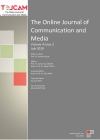TOJCAM - Volume 3 - Issue 4 - October 2017
 CINEMA AT SCHOOL FOR AN INTERDISCIPLINARY APPROACH
CINEMA AT SCHOOL FOR AN INTERDISCIPLINARY APPROACH Annamaria POLI, Fulvio Oscar BENUSSI
Abstract:
This paper presents a research concerning the introduction of Cinema at High School. This is an experimental
work on the use of Cinema as a resource for teachers and students.
The Cinema, at school of different levels, usually is suggested as “cineforum” experience, a use of cinema based
on the description of themes and a debate on the analytical interpretation of films. However describing the
contents of a medium is not enough to develop a critical approach: today’s the schools of each levels are called
to bring a different perspective on cinema and digital media education. Teachers and students, by the digital
technologies, can explore the movie experience. Learning Economics-Business and Law understanding the value
of historical cinematographic culture is the aim of this research project. The Cinema, through the early films,
promotes the interdisciplinary teaching and the introduction of visual language. This project promotes and
enhances the cinematographic heritage of the world by encouraging the teachers to introduce the Cinema at
school.
 CRITICAL APPROACH IN SOCIAL RESEARCH: FAIRCLOUGH'S CRITICAL DISCOURSE ANALYSIS
CRITICAL APPROACH IN SOCIAL RESEARCH: FAIRCLOUGH'S CRITICAL DISCOURSE ANALYSIS Şükran Gölbaşı
Abstract:
Modern society has highly integrated institutions and discourse order to maintain its current order. When we
refer to the order of society, we refer to the construction of the discourses of the various institutions that make up
it.It is the capacity of control of the order of the power and ideology to determine the structure of the given
discourse, the construction of the discourses, and the change over time.In this sense, the examination of
institutions through their discourse can provide us with very different information on other research approaches
to institutions.The methodologies of the positivist and interpretive/social constructive episteme has already
inadequate and insufficient in questioning institutions through their discourse due to the status quo nature of the
assumptions of these paradigms. For this reason, organizations need new methodologies that work with different
logic instead of questioning them with classical methods. The methodologies that work with the assumptions of
critical paradigm offer significant expansions in analyzing today's institutions. Fairclough's critical discourse
analysis of these is a rather comprehensive model that allows micro-, meso- and macro-level research in
accordance with the multi-layered nature of social research as compared to the other discourse analysis. The
purpose of this work is to explore the implications of the methods of critical realistic episteme, and specially to
discuss the Fairclough's critical discourse analysis to investigate the areas of social research, which is one of the
significant methodogy and measures to be taken to implement the method in a proper way.
 NARRATING THE PAST TO (RE)BUILD THE PRESENT OF METROPOLIS: MIAMI AND NEW YORK
NARRATING THE PAST TO (RE)BUILD THE PRESENT OF METROPOLIS: MIAMI AND NEW YORK Sheyla Moroni
 THE EMERGENCE OF SHIITE IN MALAYSIAN CYBERSPACE: A STUDY OF MAIN THEME IN THE POSTINGS OF PRO-SHIITES’ FACEBOOK
THE EMERGENCE OF SHIITE IN MALAYSIAN CYBERSPACE: A STUDY OF MAIN THEME IN THE POSTINGS OF PRO-SHIITES’ FACEBOOK Muhamad Faisal Ashaari, Mohd Azmir Maideen
Abstract:
The rapid emergence of new media has shifted the way to convey the idea and disseminate information as it
could reach the potential target group across boundaries. Indeed, Shia has utilised this medium to convey their
theological thought to public especially the heavy users of the Internet and young people. This study gives an
overview of the emergence of Shia in Malaysian Cyberspace. Specifically, it examines the extent of Shia ideas
are highlighted in the posting of Pro-Shiites’ Facebook in Malaysia. A total of 10 Facebook accounts of Pro-
Shiites are chosen as sample in this study to examine the frequent theme posted on their Facebook. The
qualitative study has been used to analyse these Facebook accounts and the data were taken from April - July
2016. Nine themes of discourse have been examined in these Facebooks’ account. The study found that the most
frequent theme highlighted is “news and information related to Shia”. Then, it follows by “the beautiful words
and the good advices”; and “Prayer, rituals and dzikir of Shia”. The rest six last themes are similarly captured in
the posting.
 YOUTH MEDIA IN TWO WORLDS: A COMPARATIVE ANALYSIS OF CHILDREN TV SHOWS IN THE PHILIPPINES AND IN GERMANY
YOUTH MEDIA IN TWO WORLDS: A COMPARATIVE ANALYSIS OF CHILDREN TV SHOWS IN THE PHILIPPINES AND IN GERMANY May Belle GUILLERGAN-SCHOTT
Abstract:
This research analysed media products that have withstood time and are well-recognised by their target audience
within the country they are produced. The observations generated systematic comparisons of the products’
formats, contents, visual characteristics and combination of educational and entertaining elements, leading to a
discovery of the inherent and specific influence media products (namely, Goin’ Bulilit vs. Die Sendung mit der
Maus, and Batibot vs. Unser Sandmännchen) have towards young audiences. It was inferred that: TV formats of
the same genre are similar despite cultural divergence. The differences lie on the cultural philosophies,
viewpoints, and values conveyed by the show. TV productions of different cultures present divergent social
values. The presentation of these values is unique to each other’s cultural context. The results pinpoint which
areas a Filipino immigrant child can possibly experience difficulty when integrating into the German community
because media focus on different values in different countries. It can be said that children who grew up in
different media environments will have developed different media literacy skills.


